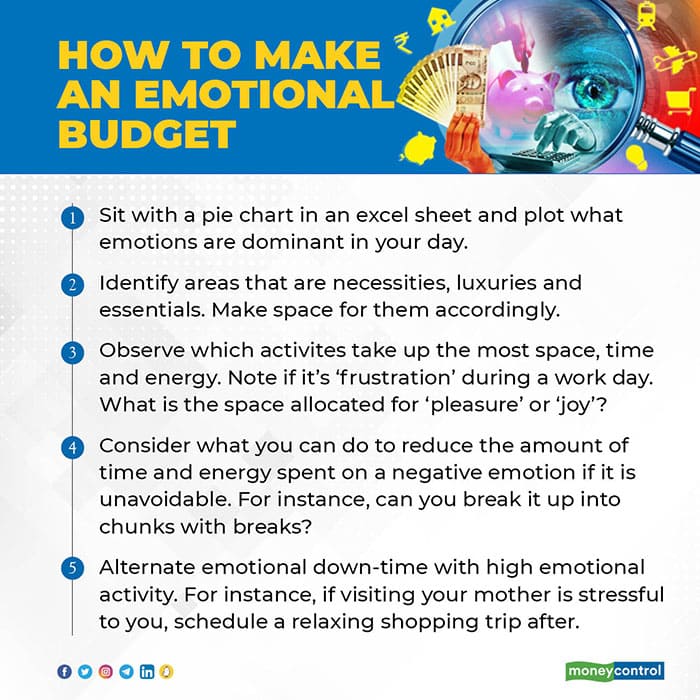



It’s budget time, and while we become interested in the challenges of allocating the limited resources we have towards various sectors of the economy, or indeed, understanding how it affects our personal portfolios, undertaking it as an annual exercise with quarterly reviews, we rarely show ourselves the same courtesy.
 Imagine if you applied the same principles of the budget to your own life. It’s a technique that works well with people who feel like certain sectors of their lives are going ‘out of control’. This could range from spending habits to time and food or even emotions.
Imagine if you applied the same principles of the budget to your own life. It’s a technique that works well with people who feel like certain sectors of their lives are going ‘out of control’. This could range from spending habits to time and food or even emotions.
The theory of constructed emotions put forward by Dr Lisa Barrett Feldman of Northeastern University, in her book How Emotions Are Made, tells us that the brain constructs emotions and so we have the responsibility, and what she calls a superpower, to direct that construction. Emotions, she tells us are essentially predictable because they arise from an established pattern. How we respond to situations, people, and how much of the emotion that we spend on them, really is in our hands. We have the ability to be emotionally dynamic and alter or reconstruct old patterns of responsiveness.
Point being, if we can budget money to the scale of a entire economy, we can also budget time, energy, emotion and how we spend them for ourselves.
Think about the last time you saw some really tragic news on the television; perhaps riots. If you responded with tears, physical disgust, revulsion, pain, sorrow, feeling disturbed, you know that your emotional responses are real and consume your emotional and physical energy. This is why you can have emotional responses sitting with you in ways you don’t realise. This is why the notion of this ‘third wave’ of the pandemic feels exhausting and draining even if you are, hopefully, not directly affected this time. We have spent a certain amount of emotion in engaging with the environment. Digital and media detoxes help when it builds up beyond a point, but it’s like putting in a financial plan after you have gone broke. It’s best to work to an emotional plan before you get to emotional bankruptcy.
Of course, we can’t regulate all our emotions. Surprises will always crop up and affect us deeply, knocking us off budget, but having a budget to begin with allows us to prioritise where we invest most of our emotional energy and tweak it as we go along. So like any decent budget, it shouldn’t be rigid, but it should take into account the non-negotiables, the unexpected, form a loose structure we can operate within and give us some leeway in the miscellaneous.
What are your non-negotiables in terms of emotion, time and energy? Have you, for instance, scheduled in some self-care time between your work day and spending time with the family, which can also be emotionally demanding.
A budget allows you to structure and prioritise. If both your work and family life are demanding, you can schedule an hour in-between when you have a coffee, read, shower, have a power nap, watch a show, go for a walk alone, and come to the next emotional demand lightly refreshed. When you begin to look at the requirements from you in terms of emotional resources in this way, you are able to allocate your limited resources better.
For instance, many of us follow the rule that we don’t want to be bothered or spoken to for at least an hour after we wake up, because it sets our day. To schedule in such pockets throughout the day eases the demands on us and ensures we have some savings in the bank. A good idea for busy parents is to take one ‘me day’ off periodically where they get to go do as they please, watch a movie, go hang with a friend, go for a trek, solo while the other parent handles the family and house.
Emotional budgeting allows you to include critical refresher feeds into your emotional resources which in turn allows you to cut out what’s a drain on you (that friend who only calls up to complain) or increase what nourishes you (example, play time with your children).

Discover the latest Business News, Sensex, and Nifty updates. Obtain Personal Finance insights, tax queries, and expert opinions on Moneycontrol or download the Moneycontrol App to stay updated!
Find the best of Al News in one place, specially curated for you every weekend.
Stay on top of the latest tech trends and biggest startup news.